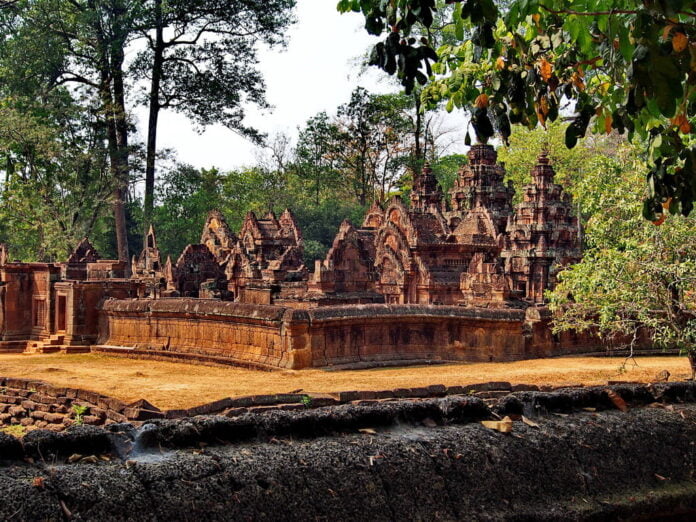
“The lady temple”, “the tiny temple”, “the pink temple”; Banteay Srei goes by many nicknames, an indication of the distinctiveness of this little gem of a temple, which feels so different to the imposing grandeur of the main Angkorian complex. Originally called Tribhuvanamahesvara, the name Banteay Srei (or Banteay Srey) is a modern one, meaning “citadel of the women” or, “citadel of beauty”. People speculate that this is due to its miniature scale, the pink colour of the limestone, and the elaborate decorative carvings of many devatas (minor female deities) that grace its walls.
How to get there
Banteay Srei is just over 20km from the main Angkor complex and a little over 30km from Siem Reap center. It’s a pretty drive by tuk tuk, through villages and rice fields, and takes around 30 minutes from the temples of Angkor. It’s also possible to do by bicycle, and is accessible by taxi as well. On the way to the temple you will pass the superb Landmine Museum; an information center and NGO which specialises in relief work for children affected by landmines and is well worth a short visit.
When to visit
The
ideal time to visit Banteay Srei is in the early morning or late
afternoon. The site is very exposed and there is little shade from the
heat of the day. The temple doesn’t feature the same mazes of corridors
as Bayon, and it’s not possible to sit in the shade of its walls like at Angkor Wat
as they are too small to create much shadow. It’s best to visit during
the cooler times of day, which can also give you the opportunity for
some stunning photos of the pink-coloured temple in the changing light.
Entrance fee
The entrance fee for Banteay Srei is included in the temple pass
for the main Angkor complex. You cannot buy a separate ticket to visit
just this temple – you will be charged another $37 – so it’s best to
make sure you combine your visit with plans to visit other sites. Many
people choose to spend some of the day at Banteay Srei and then take in
some of the outer temples in the main Angkor complex as they make the
return journey to Siem Reap. Another, often neglected, temple not far
off the road to Banteay Srei is Banteay Samre. Pretty and peaceful, it can be a welcome break from the crowds.
Banteay Srei history & rediscovery
When
Banteay Srei was first rediscovered it was thought to date back to the
13th or 14th century due to its refined carvings. However, inscriptions
later found at the site place its consecration very precisely on 22nd of
April, 967 A.D. It is the only major temple not to be built by a King.
The construction is attributed to Yajnavaraha, a courtier and King’s
counsellor. The temple was expanded and further built upon in later
years and remained in use until at least the 14th century.
The
temple was rediscovered in 1914 but the site was not initially cleared. A
few years later however, when a French politician and novelist stole
some remains from the site, the ensuring attention renewed interest in
the area and the restoration process began. The restoration was the
first really successful use of anastylosis (the process of using
original architectural elements of the building to restore it), a method
which was then adopted for the restoration of many other Angkorian
monuments.
Architecture
The temple faces the east, with a
gate at the start of a causeway which leads to three enclosures. The
causeway has the remains of corridors on either side. The two outer
enclosures, parts of which have collapsed or been removed to museums,
both depict scenes from Hindu mythology. The reddish coloured sandstone,
which gives Banteay Srei its nickname of the “pink” temple, is soft and
can be carved like wood. This helps explain the masses of ornamental
decoration all over the building. Virtually every available surface
features intricately portrayed stories and motifs. However it is the
inner enclosure housing the two libraries and the sanctuary which
features the most elaborate carvings. The temple is predominantly
dedicated to Shiva, and so many of the carvings are centered around his
figure, although Vishnu does also feature heavily in the buildings on
the south side.
Comments
Post a Comment